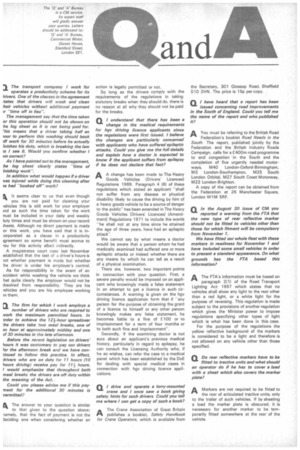1 The transport company I work for operates a productivity
Page 85

If you've noticed an error in this article please click here to report it so we can fix it.
scheme for its frivers. One of the clauses in the agreement tates that drivers will wash and clean heir vehicles without additional payment )r "time off in lieu-.
The management say that the time taken Or this operation should not be shown on he log sheet as it is not being paid for.
rhis means that a driver taking half an mar to perform this washing should book )ff work for 30 minutes before he actually inishes his duty, which is breaking the law Is I see it. Would you confirm whether 1 rm correct?
As I have pointed out to the management, he log sheet clearly states "time of 7nishing work".
In addition what would happen if a driver vas injured while doing this cleaning after re had "booked off" work?
& It seems clear to us that even though you are not paid for cleaning your /ehicles this is still work for your employer Ind as such the time taken for the work nust be included in your daily and weekly luty times and must be shown on your record ;heets. Although no direct payment is made or this work, you have said that it is in:orporated as a clause in a productivity igreement so some benefit must accrue to mu for this activity albeit indirectly.
A magistrates court case last November istablished that the test of a driver's hours is lot whether payment is made but whether he driver is under his employer's control.
As for responsibility in the event of an iccident while washing the vehicle we think hat quite clearly the employer would not be ibsolved from responsibility. They are his vehicles and you are his employee working rn them.










































































































































